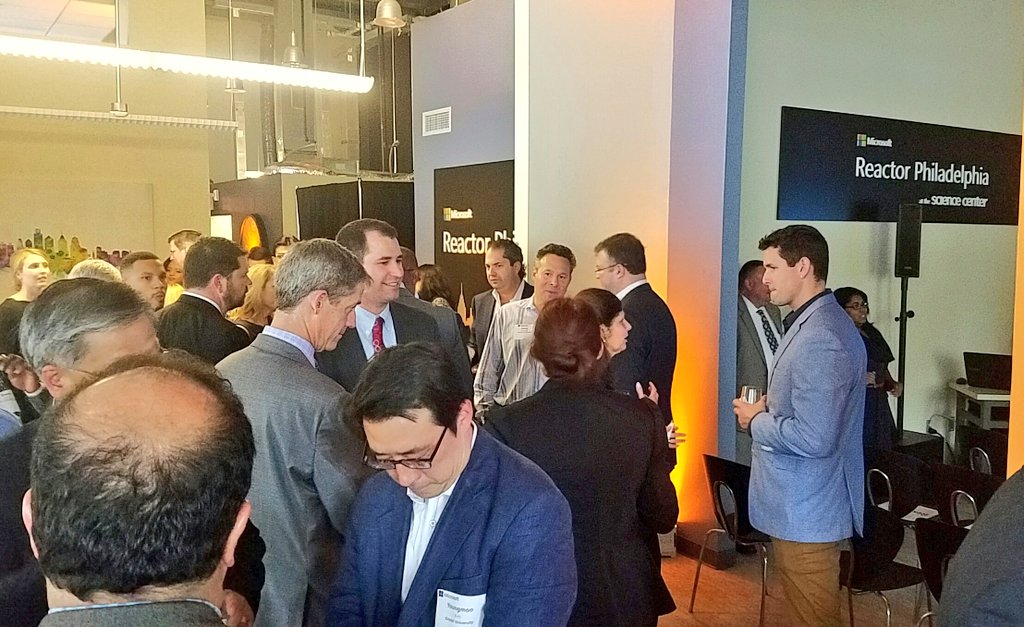“Welcome to the coolest tech space in Philly.”
With these words, the president of the University City Science Center, Stephen Tang, greeted the crowd at the official launch of the Microsoft Reactor Philadelphia on Thursday.
“The Reactor is designed to accelerate the creation of new companies, solutions, jobs and growth,” Tang said. “This is an amazing space that’s born of the collaboration of Microsoft, the Science Center, SeventySix Capital and our developing partner, Wexford Science and Technology.”
The keynote speaker of the evening was none other than Philadelphia Mayor Jim Kenney who had been MIA from public tech events since that Amazon donation to a public school last September.
“Philadelphia is thrilled to join San Francisco and New York in hosting a facility like this,” said Kenney, who also spoke passionately about the intersection of public and private entities offering possibilities for children.
“When that intersection happens, damn, anything can happen,” Kenney said. “If we continue on that intersection model, this town will take off like no other place in the world.”
Mayor Jim Kenney takes the mic. "Philadelphia is extremely excited to join San Francisco and New York in having a @MSFTReactor" pic.twitter.com/PZhNXqSS3d
— Technical.ly (@Technical_ly) November 3, 2016
Matt Thompson, Microsoft’s head of developer evangelism, said Philly was chosen on account of its mixture of academia, scrappy entrepreneurial roots and, yes, access to capital.
Why Microsoft chose Philly for @MSFTReactorPHL : it's that magic mix of academia, entrepreneurial spirit and capital – Matt Thompson
— Jeanne Mell (@jlmell) November 3, 2016
“We hope the Reactor allows innovation to come from any part of society,” said Thompson.
SeventySix Capital’s Wayne Kimmel, pointed out the joint effort all parties had to put in to make the project come through, and made a toast to innovation to wrap things up.
"We had more Skype calls than you can imagine, but we got it done," said @76Capital's @waynekimmel of @MSFTReactorPHL. pic.twitter.com/G94XRcgcKt
— Technical.ly (@Technical_ly) November 3, 2016
Microsoft’s research hub was initially branded as the Microsoft Innovation Center, but had a soft launch as the “Reactor” during the Democratic National Convention last July. At the time it was only the second such location in the country, after the flagship Reactor out in San Francisco. Since then, though, New York beat us to the punch, with the grand opening of the Microsoft Reactor New York taking place two weeks ago.
As the rebrand was announced, we wondered what set the two models apart, and why was it decided that the Philly space would become a Reactor and not an Innovation Center. Was it just a catchier name? Microsoft Senior Tech Evangelist Tommy Patterson said both types of spaces offer similar programs. The Reactor, being a newer concept, is perhaps the more evolved version of the two.
Why, though? Patterson points to the broad range of programming geared at startups like switch pitches, meetings with venture capitalists, tech workshops for local startups and access to technical advice.
“We’re all about helping companies understand what Microsoft has to offer, like cloud technologies and services,” Patterson said. “And for startups there’s quite a bit of that.”
But with that offer comes a little to-do list we think Microsoft should review as the Reactor attempts to become one with the community.
- Diversity. This is already a big challenge in Philly tech overall, and the Reactor has an advantage in having openly addressed the issue from the get go, with a digital alliance already set to take place. What’s the challenge, you ask? Bringing those plans to constant fruition and expansion.
- Opportunity, regardless of size. One of the questions this reporter gets asked frequently at tech events from entrepreneurs is: How do I land that first deal, that first investment, that first cup of coffee with a mentor? The opportunities offered at the Reactor must be open to the full scope of entrepreneurs, perhaps more urgently to those that are barely getting their foot in the door.
- Reaching out. Speaking of doors, here’s the thing about the center’s open-door policy which Patterson credits as a gateway to diversity: Maybe unlocking the door isn’t enough. Maybe it’s about knocking on other doors and drawing the community at large to join the wonderful world of VR demos and HoloLenses and Surface tablets that lies within 3711 Market St.
In the meantime, it’s pretty hard not to be optimistic about all the innovation centers popping up (or soon to pop up) in the city. The spaces are here, the people are here. Let’s see what you got, Philly.
Before you go...
Please consider supporting Technical.ly to keep our independent journalism strong. Unlike most business-focused media outlets, we don’t have a paywall. Instead, we count on your personal and organizational support.
Join our growing Slack community
Join 5,000 tech professionals and entrepreneurs in our community Slack today!

The person charged in the UnitedHealthcare CEO shooting had a ton of tech connections

From rejection to innovation: How I built a tool to beat AI hiring algorithms at their own game

Where are the country’s most vibrant tech and startup communities?

